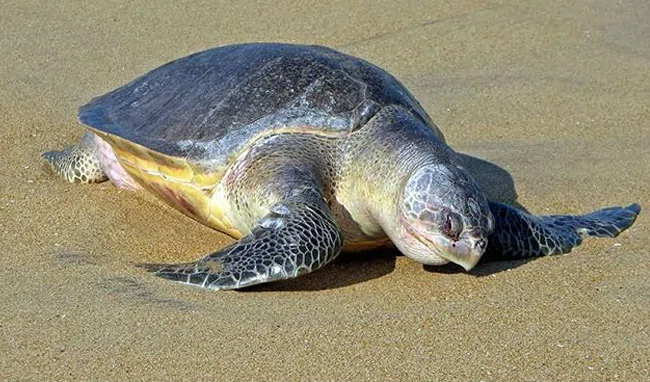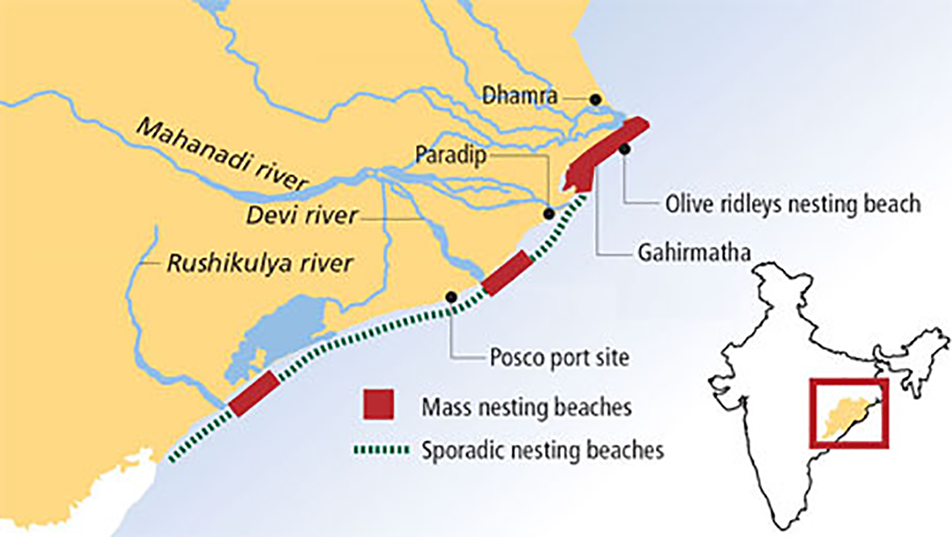Important Facts For Prelims
Olive Ridley Turtles
- 24 Dec 2021
- 4 min read
Why in News
Researchers of the Zoological Survey of India (ZSI) are carrying out tagging of Olive Ridley turtles at three mass nesting sites – Gahirmatha, Devi River mouth and Rushikulya.
- The exercise was undertaken in Odisha in January 2021 after a span of about 25 years and 1,556 turtles had been tagged.
Key Points
- Tagging and its Significance:
- The metal tags affixed to turtles are non-corrosive, which can be removed later and they do not harm their body.
- The tags are uniquely numbered containing details such as the name of the organisation, country-code and email address.
- If researchers in other countries come across the tagged turtles, they will email their location in longitude and latitude to researchers in India. There is an established network working on turtles.
- It would help them identify the migration path and places visited by the marine reptiles after congregation and nesting.
- Olive Ridley Turtles:
- About:
- The Olive ridley turtles are the smallest and most abundant of all sea turtles found in the world.
- These turtles are carnivores and get their name from their olive colored carapace.
- They are best known for their unique mass nesting called Arribada, where thousands of females come together on the same beach to lay eggs.
- Habitat:
- Protection Status:
- Wildlife Protection Act, 1972: Scheduled 1
- IUCN Red List: Vulnerable
- CITES: Appendix I
- Threats:
- Marine pollution and waste.
- Human Consumption: They are extensively poached for their meat, shell and leather, and eggs.
- Plastic Garbage: An ever-increasing debris of plastics, fishing nets, discarded nets, polythene and other garbage dumped by tourists and fishing workers.
- Fishing Trawlers: Overexploitation of marine resources by use of trawlers often violates the rule to not fish 20 kilometers within a marine sanctuary.
- There were injury marks on many dead turtles indicating they could have been trapped under trawls or gill nets.
- Initiatives to Protect Olive Ridley Turtles:
- Operation Olivia:
- Every year, the Indian Coast Guard’s “Operation Olivia”, initiated in the early 1980s, helps protect Olive Ridley turtles as they congregate along the Odisha coast for breeding and nesting from November to December.
- It also intercepts unlawful trawling activities.
- Every year, the Indian Coast Guard’s “Operation Olivia”, initiated in the early 1980s, helps protect Olive Ridley turtles as they congregate along the Odisha coast for breeding and nesting from November to December.
- Mandatory use of Turtle Excluder Devices (TEDs):
- To reduce accidental killing in India, the Odisha government has made it mandatory for trawls to use Turtle Excluder Devices (TEDs), a net specially designed with an exit cover which allows the turtles to escape while retaining the catch.
- Operation Olivia:
- About:
Zoological Survey of India (ZSI)
- It is a subordinate organization of the Ministry of Environment, Forest and Climate Change, established in 1916.
- It is a national centre for faunistic survey and exploration of the resources leading to the advancement of knowledge on the exceptionally rich faunal diversity of the country.
- It has its headquarters at Kolkata and 16 regional stations located in different geographic locations of the country.








